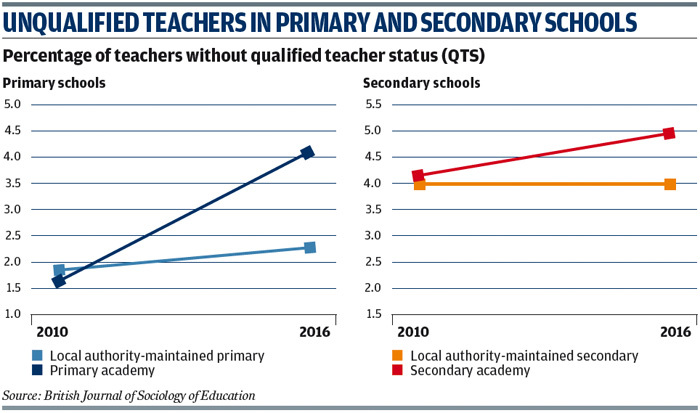Does Outsourcing School Systems Degrade Education Workforces?
Charlotte Goddard
Monday, September 23, 2019
This University of Oxford study aimed to find out whether schools that become academies show a rise in the percentage of teachers without Qualified Teacher Status (QTS).
Published by British Journal of Sociology of Education, August 2019
SUMMARY
Academies now account for two thirds - 66 per cent - of all state secondary schools and 30 per cent of primary state schools. In 2012, the government extended the freedom to employ teachers without Qualified Teacher Status (QTS), already enjoyed by independent schools and free schools, to academies. The idea was to encourage schools to employ experts in their fields who might not have teaching qualifications but teaching unions feared the move would encourage schools to cut costs by employing cheaper, less-qualified staff. This University of Oxford study aimed to find out whether schools that become academies show a rise in the percentage of teachers without QTS.

The study analysed information from a new dataset combining the government's annual school workforce censuses with its Schools, Pupils and their Characteristics surveys from 2010 to 2016. It found academies have hired more than 1,500 more teachers without QTS than otherwise equivalent local authority-maintained schools. In 2016, 2.3 per cent of teachers employed in council-maintained primary schools did not hold QTS, up from 1.8 per cent in 2010. Meanwhile, 4.1 per cent of teachers employed in a primary academy did not hold QTS, up from 1.7 per cent in 2010. When it came to secondary schools, four per cent of teachers in maintained schools did not hold QTS in 2010 and 2016, while academies saw the percentage rise from 4.1 to five percent.
When the researcher took other factors, such as deprivation, into account, they found primary schools that gained academy status saw the percentage of unqualified teachers rise by an average 1.31 percentage points. The proportion of unqualified teachers rose slightly for every year the school had been an academy. By 2016 the average primary school academy had been an academy for 3.3 years with an estimated 1.69 percentage point increase in teachers without QTS compared with local authority-maintained schools. This is the equivalent of swapping 789 qualified teachers for teachers without QTS in these academies and means more than 21,000 pupils were taught by teachers without QTS in primary academies in 2016.
The research also found primary schools with more pupils from poor and ethnic minority backgrounds had a greater percentage of teachers without QTS. For every 100 poor pupils in local authority-maintained schools, 1.2 per cent of teachers did not have QTS but this increased to 1.9 per cent in academies. Primary schools in urban areas were found to be recruiting more teachers without QTS than those in rural areas. Meanwhile, schools with poorer Ofsted grades tended to hire more teachers without QTS than those with better ratings, suggesting poorly performing schools struggle to recruit qualified teachers.
The research also looked at different types of academies and found converter and sponsored multi-academy trusts showed a significant difference from local authority-controlled schools in terms of the percentage of unqualified teachers from the first year they became an academy.
Secondary schools becoming an academy show a 0.23 percentage point increase in the proportion of unqualified teachers with smaller increases for every year the school had been an academy although there are more teachers working in secondary education. By 2016, the average secondary academy had been an academy for 4.8 years with an estimated 0.9 percentage point increase in the percentage of teachers without QTS - the equivalent of exchanging 962 qualified teachers for teachers without QTS. Schools with more pupils from lower socio-economic backgrounds tended to hire more teachers without QTS - almost double that in local authority-maintained schools. As with primary schools, secondary schools with poorer Ofsted ratings hired more teachers without QTS.
IMPLICATIONS FOR PRACTICE
The study suggests the academy programme is widening class-based inequality as pupils are more likely to be denied access to qualified teachers. Schools may be hiring teachers without QTS due to shortages of qualified teachers so there is a need to tackle the crisis in teacher recruitment and retention.
FURTHER READING
Does Greater Primary School Autonomy Improve Pupil Attainment? Evidence from Primary School Converter Academies in England, Joseph Regan-Stansfield, Economics of Education Review, April 2018
The Impact of Academies on Educational Outcomes, Jon Andrews and Natalie Perera, Education Policy Institute, July 2017
Social Inequalities in Access to Teachers - Social Market Foundation Commission on Inequality in Education: Briefing 2, Rebecca Allen, Emran Mian, and Sam Sims, Education Data Lab, April 2016




